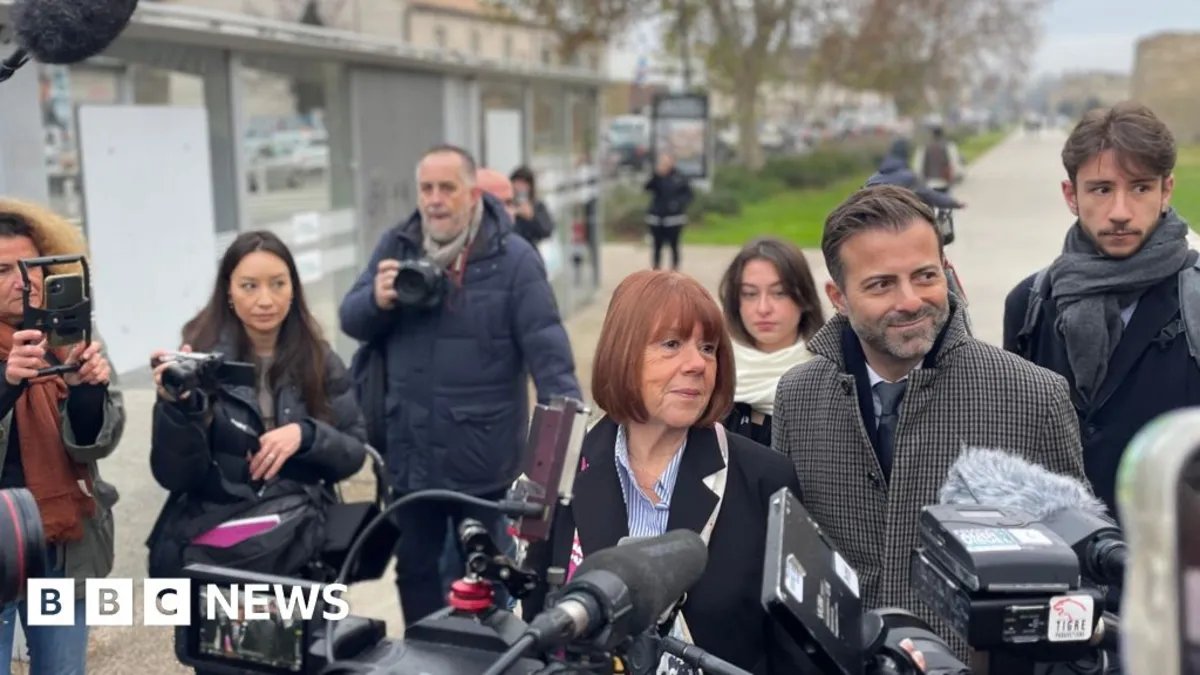
On Monday, Gisèle Pelicot, the victim of a mass rape case that shocked France, will return to court to confront one of her attackers. This man is the only individual appealing against the verdict from last year’s trial, where a total of 51 men were convicted of sexually assaulting her while she lay drugged by her husband in their home. At that time, Madame Pelicot's courageous public stance was viewed as a potential turning point in the ongoing battle against sexual violence in France. However, a year later, the prevailing optimism appears to be fading.
In the picturesque town of Mazan, where Gisèle and her husband Dominique once lived, tensions brew beneath the surface. One man, visibly agitated, threatened violence outside a medieval church, expressing frustration over the Pelicot case’s association with the town. His outburst came after overhearing a conversation about the case's impact, highlighting a sentiment among some residents who wish to distance themselves from what has become one of the world’s most infamous rape trials.
Notably, the mayor of Mazan, Louis Bonnet, issued a statement describing Gisèle Pelicot's ordeal as a private matter that doesn't concern the community. This public stance aims to protect the town's reputation and tourism, but it contradicts his earlier comments, where he downplayed the seriousness of the situation because "no one was killed, and no children were involved."
Despite the mayor's attempts to minimize the event, many women in Mazan have a different perspective. Aurélie, a 33-year-old civil servant, expressed her frustration, noting that the community has largely ignored the case: "No one talks about it anymore, even here in Mazan. It's as if it never happened." She also revealed that domestic violence persists in silence, as women fear the men who perpetrate these acts.
Conversely, Aurore Baralier, a 68-year-old resident, believed that the Pelicot case has contributed positively to societal change. "The world is evolving. France is evolving," she stated, suggesting that Gisèle's bravery has empowered women to speak out against sexual violence. The publicity around the case has indeed galvanized a movement that aligns with the momentum of the MeToo movement.
The determination exhibited by Gisèle Pelicot has sparked significant discussions about sexual violence in France. According to Alyssa Ahrabare, who coordinates a network of feminist organizations, the Pelicot case has led to a historic mobilization against both sexual violence and impunity. "Yes, France has changed," Ahrabare noted, highlighting that reports of rape have tripled, indicating that victims, particularly women and girls, are more willing to come forward in search of justice.
However, despite this apparent increase in awareness and reporting, many experts argue that actual progress in tackling sexual violence remains stagnant. Céline Piques, a spokesperson for the NGO Dare to be Feminist, emphasized that the government's response has been inadequate, with conviction rates failing to improve despite the rising number of reported cases. "The picture is bleak. There is a backlash," she warned, noting the resurgence of rape culture and the rise of the masculinist movement among youth.
In light of ongoing financial and political challenges in France, the government has defended its record on handling sexual violence, claiming to have significantly increased funding in this area. Yet, a recent Senate report criticized the government's lack of strategic direction. Furthermore, the Council of Europe has echoed concerns regarding France's efforts to protect women.
Despite these challenges, occasional incidents provide a glimmer of hope. In August, a 60-year-old man was arrested in Dijon for drugging his wife to facilitate her rape, after one of the participants called the police out of concern for her consent. The lawyer representing the alleged victim believes that the awareness generated by the Pelicot case influenced this decision to report.
Additionally, in a landmark ruling, French film star Gérard Depardieu was found guilty of sexually assaulting two women, marking a significant legal victory against a culture of impunity often shielding powerful men. "It could mean something," stated lawyer Elodie Tuaillon-Hibon, highlighting the importance of accountability for high-profile figures.
As Gisèle Pelicot prepares to face her attacker once again, her journey continues to resonate deeply across France, igniting discussions about sexual violence and the systemic changes needed to protect victims. The ongoing struggle for justice remains a crucial part of France's evolving narrative on this pressing issue.